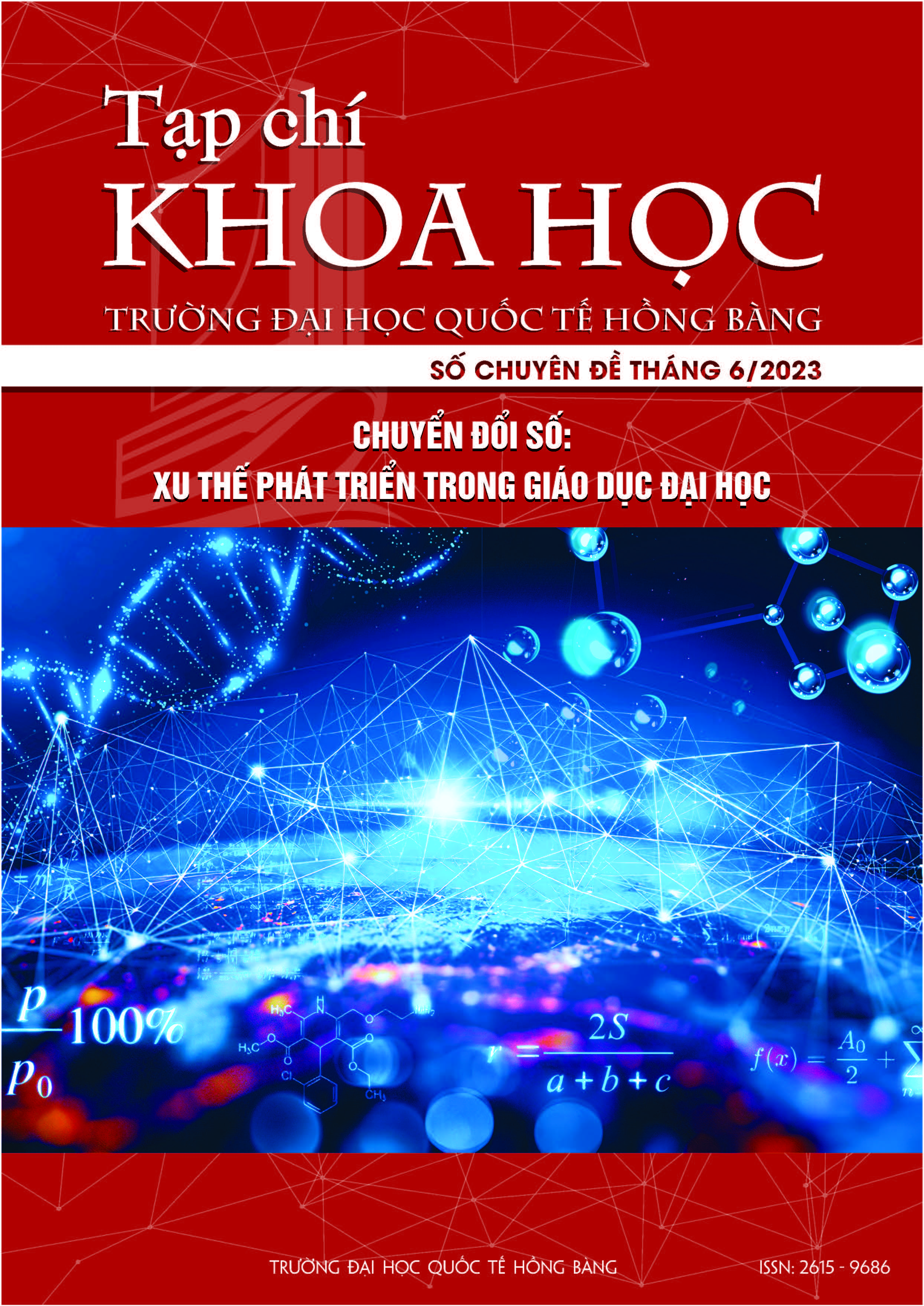Xây dựng chuẩn đầu ra dựa trên năng lực số đáp ứng nhu cầu nguồn nhân lực cho chuyển đổi số đối với các trường đại học
Các tác giả
DOI: https://doi.org/10.59294/HIUJS.CDS.2023.358Từ khóa:
Chuyển đổi số, chương trình đào tạo, chuẩn đầu ra, năng lực số, nguồn nhân lựcTóm tắt
Chuyển đổi số là một trong những nội dung cốt lõi và đóng vai trò cực kỳ quan trọng trong phát triển kinh tế xã hội hướng đến mục tiêu của cuộc cách mạng công nghiệp 4.0. Chuyển đổi số không chỉ đề cập về cải tiến công nghệ mà còn có cả thay đổi về nhận thức, mô hình quản lý và chiến lược quản trị. Chuyển đổi số trong giáo dục là một trong những nội dung chủ yếu của chuyển đổi số quốc gia. Để đạt được mục tiêu chuyển đổi số trong giáo dục thì việc xây dựng các chương trình đào tạo đáp ứng được các tiêu chí năng lực số của chuẩn đầu ra của sinh viên là một yếu tố quan trọng nhằm cung cấp nguồn lao động phù hợp cho quá trình chuyển đổi số. Vì vậy, trong bài báo này chúng tôi trình bày một số vấn đề liên quan đến việc chuyển đổi số, năng lực số trong xây dựng chương trình đào tạo hướng đến mục tiêu đào tạo nguồn nhân lực cho chuyển đổi số đối với các trường đại học ở Việt Nam. Một vài trao đổi về xây dựng chương trình đào tạo với chuẩn đầu ra được thiết kế tiếp cận năng lực số tại Trường Đại học Quảng Bình.
Abstract
Digital transformation is one of the core content and plays an extremely important role in socio-economic development towards the goal of Industry 4.0. It is not only about improving technology but also changing awareness, management model and management strategy. Digital transformation in education is one of the major contents of national digital transformation. In order to achieve the goal of digital transformation in education, the building of the curriculum to response the digital literacy criteria for student outcome standards is an important issue for providing digital human resource. Therefore, in this paper, we represent some issues related to digital transformation, digital literacy in the curriculum towards the goal of training human resource for digital transformation for higher education in Vietnam. A case study of the curriculum in Quang Binh University will be discussed.
Tài liệu tham khảo
[1] S. Coskun, Y. Kayikci and E. Gencay, “Adapting Engineering Education to Industrie 4.0 Vision," 2017. DOI: arXiv preprint arXiv:1710.08806.
[2] V. Puncreobutr, “Education 4.0: New Challenge of Learning,” St Theresa Journal of Humanities and Social Sciences, 2(2), pp.92-97, 2016,
[3] D. K. Cetindamar and B. Abedin, “Understanding the role of employees in digital transformation: conceptualization of digital literacy of employees as a multi-dimensional organizational affordance,” Journal of Enterprise Information Management, 34(6), pp. 1649-1672, 2021.
[4] L. Seres, V. Pavlicevic and P. Tumbas, “Digital transformation of higher education: Competing on analytics,” In INTED2018 Proceedings, 2018, pp. 9491-9497, 2018.
[5] P. Thao, “Digital transformation in education: Advantages and challenges in 2021,”. [trực tuyến]. Địa chỉ: https://magenest.com/en/digital-transformation-in-education/.
[6] M. Vaskov, A. Isakov, V. Bilovus, A. Bulavkin and N. Mikhaylenko, “Digital literacy of modern higher education teachers,” in E3S Web of Conferences, Vol. 273, p. 12035, 2021.
[7] T. Soublis, “Transdisciplinary pedagogy: A competency based approach for teachers and students to promote global sustainability”. Journal of Interdisciplinary Studies in Education, 5(2), pp. 64-72, 2017.
[8] Khung năng lực số dành cho sinh viên, Đại học Khoa học Xã hội và Nhân Văn, ĐHQGHN
[9] A. Martin, “Digital Literacy and the Digital,” Digital literacies: Concepts, policies and practices, 30(151), pp. 1029-1055, 2008.
[10] A. Monteiro and C. Leite, “Digital literacies in higher education: Skills, uses, opportunities and obstacles to digital transformation,” Revista de Educación a Distancia (RED), 21(65), 2021.
[11] B. S. Chan, D. Churchill and T. K. Chiu, “Digital literacy learning in higher education through digital storytelling approach,” Journal of International Education Research (JIER), 13(1), pp. 1-16, 2017.
[12] C. McGuinness and C. Fulton, “Digital literacy in higher education: A case study of student engagement with e-tutorials using blended learning,” Journal of Information Technology Education: Innovations in Practice, 18, pp. 001-028, 2019.
[13] M. Spante, S. S. Hashemi, M. Lundin and A. Algers, “Digital competence and digital literacy in higher education research: Systematic review of concept use,” Cogent Education, 5(1), 1519143, 2018.
[14] T. Đ. Hòa và Đ. V. Hùng, “Khung năng lực số cho sinh viên Việt Nam trong bối cảnh chuyển đổi số,” Tạp chí Thông tin và Tư liệu, 2021, 1, pp. 12-21, 2021.
[15] N. W. Y. Law, D. J. Woo, J. de la Torre, and K. W. G. Wong, “A global framework of reference on digital literacy skills for indicator 4.4.2,” 2018.
[16] P. X. Hậu, “Sáng tạo và những thách thức của dạy học theo dự án trong bối cảnh cách mạng công nghiệp lần thứ 4,” trong Kỷ yếu Hội thảo quốc tế Phát triển năng lực sáng tạo và cơ hội cho các ý tưởng kinh doanh khởi nghiệp, 2017.
Tải xuống
Tải xuống: 458











